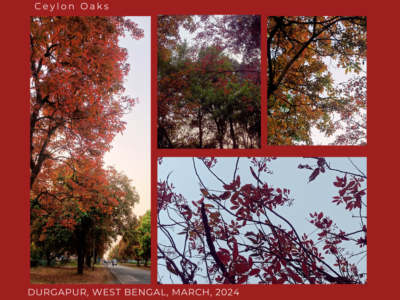As one navigates through the beautifully designed book, one learns the story behind the grim-faced ‘canine’ on the cover and the poet’s attempt to cancel noise, says Arun Kumar in his review of ‘Noise Cancellation’. Jhilam Chattaraj’s second book of poems highlights the need to slow down in today’s world
Ears pour nude noise
on palms that swell and spill.
Bones bloom on strange beds,
they don’t fear this storm.
Sea of rage, sick with a slab of glass,
phones turn the key;
click, click, click —
the birth of a sound.
Ah! the whip of time
lost on a map of lies.
Birds feed the blind sun,
our eyes buzz like bees.
I Let Go / I Let Go.
I seek the slow pause,
the quiet way of plants,
pale plumes float, mid-air,
my wine melts into rain.
Dog-like, I wait
at the door of monks
for milk and hugs.
I learn to live mild.
Sit, eat, pray
for a change,
a sweet hint of spring light.

Jhilam Chattaraj
The dreaminess of nostalgia, simple pleasures of everyday life, and struggles of real people – all form the subject of her written word. There is a pain in her writings, and there is also hope. The above-mentioned poem titled ‘Noise Cancellation’ is poet, author Jhilam Chattaraj’s second book by the same name.
Are poets blessed with a third eye? How is it that they are able to articulate mundane objects in a magical manner? Such questions hovered around, while I read through Jhilam Chattaraj’s second book of poems, Noise Cancellation. As one navigates through the beautifully designed book, one learns the story behind the grim-faced ‘canine’ on the cover and the poet’s attempt to cancel noise – says Arun Kumar, Librarian, Chirec International School, Hyderabad.
Read on for his review of ‘Noise Cancellation’ :
Jhilam’s book addresses three important complexities of our present life; the overwhelming impact of technology, the myriad aspects of the pandemic, and the enduring value of everyday details. The title poem, ‘Noise Cancellation,’ critiques a world governed by digital data:
Ears pour nude noise
on palms that swell and spill.
Bones bloom on strange beds,
they don’t fear this storm.
Sea of rage, sick with a slab of glass,
phones turn the key;
click, click, click —
the birth of a sound. (p. 21)
Internet and the constant flow of information has reduced our attention span and life-experiences of decades into a matter of a few seconds. The poems along with the Cinquain series on plants, highlight the need to slow down and savour the little joys of life:
Trees know
not the speed of
man nor his fruitless ways.
Soiled nails, sunny arms, they simply
grow — grow. (p. 82)
Secondly, Jhilam explores problems of the pandemic, both personal, political and aesthetic. Her poems on the pandemic are not reformatory or didactic in nature. They are pleasurable and reflective. In the poem, ‘Under the Peepal Tree,’ she weaves several haunting images of covid patients lying under the Peepal tree to inhale oxygen:
They laid you under the cool shade
of the Peepal; its ceaseless flow of perfumed oxygen.
Your body, supine on the perspiring earth of May.
A wrinkled bag, a glass of water,
a pocket full of holy stones;
quiet testimonies to windless words.
Beneath the breath of gods and flies,
you prayed on a mattress of memories
to loosen the knots in your blood,
to expand into the light and liberation
of the Bulbul among the boughs.
And now, perhaps, nothing remains of you. (p.19)
In the poem, ‘Untouchables,’ Jhilam draws parallel between lovers of present-day with Kalidasa’s Yaksa who in ‘Meghaduta’ pined for messages of his beloved from the clouds. The poem is lyrical and concludes with a positive affirmation:
Clouds rewrite fallen promises,
in swarms, onwards.
We may collapse under this ailing swill
but one day our bones will sing sunward. (p. 46)
The third and the most important aspect of the book lies in its faith in everyday realities; poems like ‘Aloo Posto,’ ‘Phuchka’ and ‘Ugadi Pachadi,’ apart from testing ones’ taste buds, also show how such common objects become the source of eternal joy. Poems like ‘Sari’ and ‘Lizards’ are bound to make one rethink the vital role of the usually negligible realities of our everyday life. Tiny details are also pitched in the context of capitalist aspirations. The poem ‘Final Feathers’ traces the extinction of the Great Indian Bustard due to the construction of windmills in the deserts of Western India. The poem shows an acute sense of despair as Vasanth Kannabiran writes, it ‘leaves you gasping for breath.’ Certain themes are repeated in poems like ‘Toil of the Toddy’ where Jhilam talks about the difficulties of toddy tappers and ‘Block Prints’ where she comments on the gradual replacement of the handloom industry with machines.
Jhilam is also ‘wry-humoured’ as Arundhathi Subramaniam notes in the Blurb. Her darkly comic take on academic problems in ‘The Windmill,’ social commentary on gender stereotypes in poems like ‘Lipstick’ and ‘My Hair Won’t Cry’ are a thoughtful and sharply crafted pieces that reveal a poet who takes the world with a pinch of salt. She is not outragedly rebellious or cynical but simply trying to find her way out of the chaos. Her writing as Sudeep Sen mentions in the blurb, is ‘visceral’ and highlights ‘the contrapuntal dualities’ of our current times.
The poems are diverse, though the central idea is constant. The exhaustive collection of notes sometimes makes the reading a heavy process but they will be enjoyed by readers unfamiliar with cultural details in the poems. This book is definitely worth spending your time. It is recommended to readers looking for words to shake-off the post-pandemic stagnation and look at the world afresh.
Book: Noise Cancellation
Genre: Poetry
Author: Jhilam Chattaraj
Publisher: Hawakal Publishers, New Delhi, Kolkata
Language: English
Price: INR 350 | USD 14.99
About the poet
Jhilam’s works have been published at Colorado Review, World Literature Today Room, Porridge, Not Very Quiet, Queen Mob’s Tea House, and Asian Cha among others. Amongst the books that she authored are Corporate Fiction: Popular Culture and the New Writers and When Lovers Leave and Poetry Stays (poetry). She received the CTI Excellence Award in “Literature and Soft Skills Development,” 2019 from the Council for Transforming India and the Department of Language and Culture, Government of Telangana, India.
















